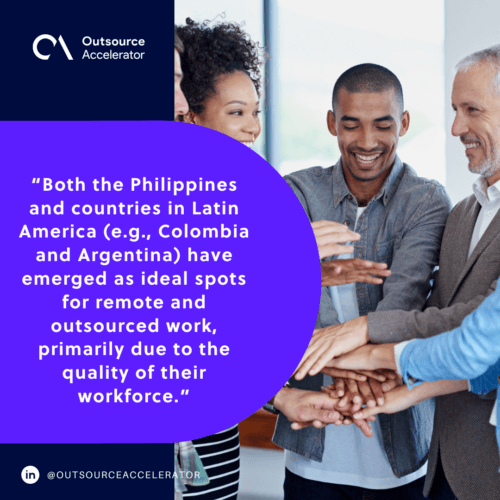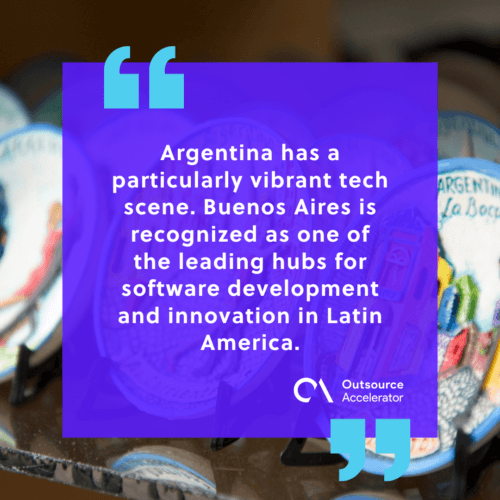The myth of quality: Are overseas workers just as capable as local talent?

This article is a submission by Globaltize. Globaltize is a boutique staffing agency established by seasoned entrepreneurs who have leveraged global talent to grow their businesses. They provide comprehensive staffing solutions, delivering tailored, cost-effective global talent.
If you’ve been hiring globally, you’ve probably heard it before: “Are overseas workers really as good as local talent?”
For years, skepticism has lingered about hiring from countries like the Philippines, Colombia, and Argentina.
The assumption often goes that local workers will deliver higher quality, while overseas workers are more of a budget-friendly choice than a high-caliber one. But here’s the thing: that assumption is way off the mark.
In recent years, a growing number of companies have found that workers from these regions not only meet but often exceed the quality standards found in the United States.
From education and work ethic to adaptability and cultural alignment, countries like the Philippines, Colombia, and Argentina have quietly become powerful talent hubs.
Let’s break down why these global hires are worth the investment and how they bring more than just “cost-saving” benefits to the table.
Why companies are looking to the Philippines and Latin America
Both the Philippines and countries in Latin America (e.g., Colombia and Argentina) have emerged as ideal spots for remote and outsourced work, primarily due to the quality of their workforce.
With an increase in remote work, companies are looking beyond borders and finding that international hires aren’t just an option—they’re often an upgrade.
From customer support and software development to creative services and marketing, professionals in these countries bring a wide array of talents to the table.
And beyond just being able to fill roles, they bring a dedication to quality that often surprises those unfamiliar with the regions.

Education and skill in the Philippines: A foundation of quality
The Philippines has a reputation for producing some of the world’s best English-speaking professionals. The country ranks among the top in English proficiency across Asia, and with a literacy rate of over 98%, the workforce is highly educated and skilled in a range of fields.
Schools and universities in the Philippines strongly emphasize subjects like business, technology, and healthcare, all areas where the country’s workforce excels.
Filipino professionals also benefit from extensive training in Western culture and business practices. Many of them are taught from an early age about the cultural nuances and expectations of Western countries, particularly the United States.
This makes Filipino workers not only highly skilled but also culturally aligned, which reduces misunderstandings and fosters smoother collaboration.
Cultural advantages of Filipino talent
Filipino culture is rooted in values of hard work, respect, and commitment, which aligns well with corporate cultures in the U.S. and other Western nations.
Filipinos are known for a “service-oriented” mindset. They prioritize customer satisfaction, responsibility, and dedication to their roles.
These people bring a “can-do” attitude to their work and are typically eager to go the extra mile.
For example, the culture of empathy and patience shines through in customer service and support roles. Many Filipinos are trained to handle customers with professionalism and care.
Their approach has even been noted in research as a primary reason why customer service from the Philippines often scores as high, if not higher, than locally sourced talent.
This culturally ingrained dedication can have a significant impact on a business’s reputation for quality service and support.
Colombia and Argentina: Education and innovation powerhouses
In Latin America, Colombia and Argentina have been building impressive educational ecosystems with a growing focus on:
- Technology
- Innovation
- Professional development
Colombia, for instance, has made strides in improving its educational system over the last two decades. The country has invested in higher education and aligned its curriculum to meet global standards.
Colombian universities now emphasize fields such as engineering, IT, and business, producing highly skilled graduates ready to step into complex roles.
Argentina, likewise, has a strong educational foundation, with public universities like the University of Buenos Aires producing world-class professionals in fields ranging from medicine to technology.
Argentina has a particularly vibrant tech scene. Buenos Aires is recognized as one of the leading hubs for software development and innovation in Latin America.
This emphasis on education and development means that professionals from Colombia and Argentina are not only highly skilled but also adaptable and eager to stay on the cutting edge.

Hard work, dedication, and the “Why” behind Latin American talent
Cultural values in both Colombia and Argentina revolve around:
- Hard work
- Respect for education
- Desire to innovate
In many cases, workers from these countries have an intrinsic motivation to perform well, especially when working with international companies.
They take pride in the work they produce and view remote roles as an opportunity to make a meaningful impact both locally and globally.
In addition, Latin American countries are known for their strong sense of family and community, which translates into loyalty and dedication in the workplace.
Colombian and Argentine professionals often approach their roles with a long-term perspective, seeking stability and career growth. This mindset helps companies reduce turnover and build teams with dedicated, engaged employees who care deeply about their work.
Overcoming stereotypes: Real benefits of hiring overseas workers
One of the biggest barriers to companies hiring internationally is the misconception that overseas talent can’t match local talent in quality. But data tells a different story.
According to a study by the World Economic Forum, employees in the Philippines, Colombia, and Argentina scored high on adaptability, problem-solving, and communication skills—qualities that directly impact job performance and team dynamics.
Hiring from these regions doesn’t mean compromising on quality; it means embracing a different set of strengths.
Thanks to their diverse backgrounds and experiences, overseas workers often bring unique perspectives and solutions. This diversity can be a huge asset, especially for companies looking to innovate and remain competitive.
In fact, many companies report that their remote teams from these countries are some of the most engaged, adaptable, and skilled contributors.
How U.S. companies can benefit
The global talent pool isn’t just a backup option; it’s a goldmine of opportunity. Here are some ways U.S. companies stand to gain:
- Cost-effectiveness without sacrifice. Yes, hiring overseas can be budget-friendly, but that doesn’t mean you’re sacrificing quality. Instead, it allows companies to allocate resources to other critical areas, creating a balanced, cost-effective business model.
- Access to a diverse skill set. Whether it’s tech, customer service, or creative fields, overseas workers bring specialized skills honed in rigorous educational environments and proven in global markets.
- 24/7 availability. Companies with international teams can operate around the clock, meeting client demands and pushing projects forward without delay. This means faster turnaround times and an edge over competitors who work within a single time zone.
- High cultural compatibility. Professionals from the Philippines and Latin America are not only skilled but often share a strong cultural alignment with Western work practices, making them easy to onboard and collaborate with.

Tapping into a wide pool of overseas workers
It’s time to dispel the myth that local talent is always the “better” option. The talent emerging from the Philippines, Colombia, and Argentina is not only competitive but, in many cases, exceptional.
With strong educational backgrounds, a dedication to quality, and cultural values that align well with Western business practices, professionals from these regions bring more than just skills—they bring a commitment to excellence that benefits companies in tangible ways.
Hiring internationally is no longer just about saving money; it’s about tapping into a world of talent that can drive growth, innovation, and success.
So, next time you’re considering an overseas hire, remember: quality isn’t limited by borders.







 Independent
Independent




